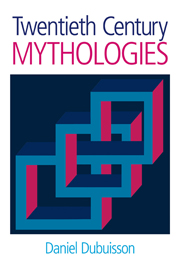Book contents
- Frontmatter
- Epigraph
- Contents
- Foreword by Professor Robert A. Segal
- Preface
- Abbreviations
- Introduction: History and comparative epistemology
- Part I Georges Dumézil, or Society
- Part II Claude Lévi-Strauss, or the Mind
- 7 The symbolic order
- 8 The Mythologiques: from overture to finale
- 9 From Marx to Kant
- 10 The semantics of myth
- 11 A Buddhist among the Bororo
- Part III Mircea Eliade, or the Sacred
- Conclusion: Modern theories of myth and the history of Western thought
- Bibliography
- Index
11 - A Buddhist among the Bororo
from Part II - Claude Lévi-Strauss, or the Mind
- Frontmatter
- Epigraph
- Contents
- Foreword by Professor Robert A. Segal
- Preface
- Abbreviations
- Introduction: History and comparative epistemology
- Part I Georges Dumézil, or Society
- Part II Claude Lévi-Strauss, or the Mind
- 7 The symbolic order
- 8 The Mythologiques: from overture to finale
- 9 From Marx to Kant
- 10 The semantics of myth
- 11 A Buddhist among the Bororo
- Part III Mircea Eliade, or the Sacred
- Conclusion: Modern theories of myth and the history of Western thought
- Bibliography
- Index
Summary
One of the most unexpected chapters on the work of Lévi-Strauss was written by Ivan Strenski, and appeared in the United States in 1980, before my own work on the same issue in France. It is true that it concerns the profound but widespread influence of a thought – Buddhist thought – that in general is very poorly known. This is why this influence, iBefore addressingvctim of such collective ignorance, has been underestimated and considered very secondary or anecdotal: one of those intellectual caprices, exotic and inoffensive, that great minds like to indulge in at times. It was inevitable, under the circumstances, that this lack of knowledge and indifference would provoke and harbour a profound misunderstanding, which still deforms the potential perception of this major work today.
In opposition to this obstinate tendency, the present chapter aims at nothing less than proving that the Lévi-Straussian system possesses an eminently metaphysical dimension that draws part of its inspiration from ancient Buddhism; that is, from a Buddhism that is doubtless idealized, atemporal, denuded, and austere, reduced to superior principles, and not yet invaded by the proliferation of cults and marvels.
Before addressing the demonstration required by such affirmations, let us locate exactly the misunderstanding of which the thought of Lévi-Strauss seems to be a victim.
- Type
- Chapter
- Information
- Twentieth Century Mythologies , pp. 161 - 170Publisher: Acumen PublishingPrint publication year: 2006

